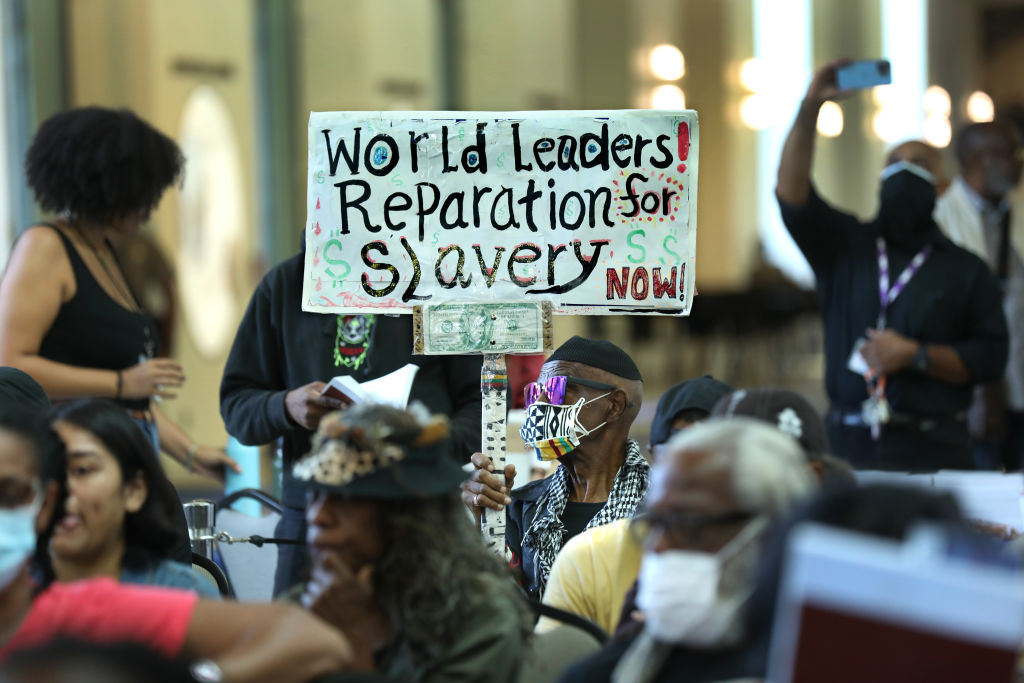Fate Of Reparations For Black Californians Now In The Hands Of Lawmakers And Gov. Gavin Newsom
Source: Carolyn Cole / Getty
Reparations for Black Californians take another step in the direction of becoming a reality. The fate of reparations is now in the hands of lawmakers and California Governor Gavin Newsom.
MORE: 40 Acres And A Mule: What Are Reparations And Why Is The Concept So Polarizing?
California’s Reparations Task Force has completed its two-year report and will deliver its final reparations proposal to the state’s legislature on Thursday. Lawmakers then must come to an agreeance with Gov. Newsom for the policy recommendations from the task force to be turned into legislation.
In the final report, the Committee detailed years of discrimination against Black Californians, which included voting, housing, education, disproportionate policing and incarceration as well as others.
One of the first recommendations from the panel is that lawmakers craft an apology on behalf of the state that must “include a censure of the gravest barbarities.” Secondly, the panel recommends a new agency be created specifically to provide services to descendants of enslaved people as well as provide cash payments to those eligible.
California’s Reparations Task Force consists of nine members: Senator Steven Bradford, Dr. Amos C. Brown, who is the vice-chair of the committee, Dr. Cheryl Grills, Lisa Holder, Assemblymember Reginald Jones-Sawyer, Chair member Kamilah Moore and Councilmember Monica Montgomery Steppe. Each member has been fully invested and committed to flushing out a detailed report which could be the catalyst to federal change when it comes to reparations.
“It’s been a whirlwind, it’s been very work intensive, but also very cathartic and very emotional,” said Kamilah Moore, 31, task force chair and a Los Angeles-based attorney. “We’re standing in the shoes of our ancestors to finish, essentially, this sacred project.”
According to the state of California’s Department of Justice website, the task force members were selected from diverse backgrounds to represent “the interests of communities of color throughout the state” and “have experience working to implement racial justice reform.”
Although the task force’s job is complete, there are still lingering questions as to how reparations allocations will work.
As NewsOne previously reported, after hours of deliberation and emotional testimonies, committee members hashed out a 5-4 vote in favor of limiting reparation payments to Black Californians who are descendants of U.S. slaves. It’s still unclear as to how the money will be distributed and how much restitution will be given to eligible Black Californians.
The task force gave two recommendations for how those eligible could be compensated: cumulative compensation for an eligible class and particular compensation for individuals for provable harms.
Cumulative compensation takes into account community harms such as health disparities, mass incarceration, over-policing and housing discrimination. Particular compensation would require documented evidence of their harm before being eligible for payouts.
Other proposals from the group include declaring election day a paid state holiday, restoring voting rights to all formerly and currently incarcerated people, and implementing rent caps in historically redlined neighborhoods.
“Overall, what we said is we believe there should be compensation, elders should be prioritized and it should be in installments,” Kamilah Moore told AP.
There is no telling which way the pendulum of reparations will swing, but Black Californians are poised to finally receive something that was promised to them more than 150 years ago.
SEE ALSO:
Black Californians Question How Reparations Money Will Be Allocated
Op-Ed: Reparations Must Be More Than A Check
The post Fate Of Reparations For Black Californians Now In The Hands Of Lawmakers And Gov. Gavin Newsom appeared first on NewsOne.

